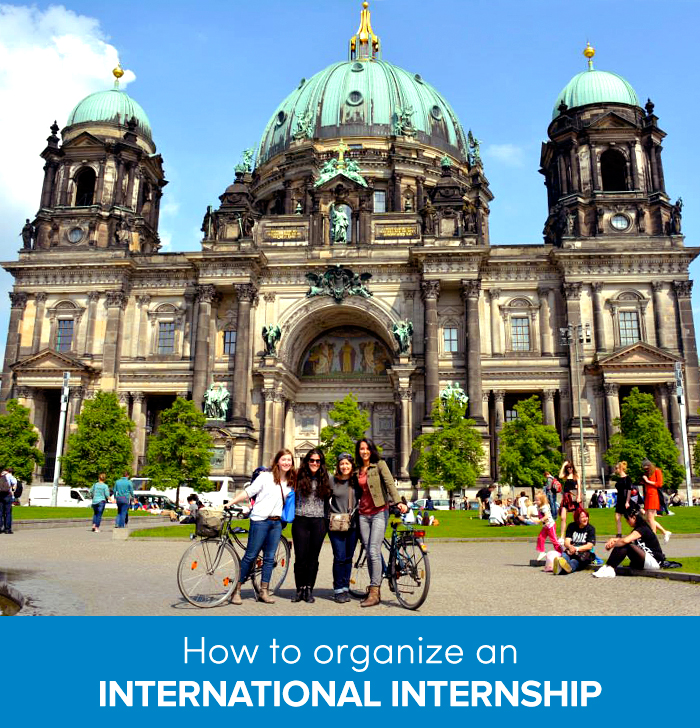How to Organize an Internship Abroad for Free
Read on to find out the best ways to organize an internship abroad for free!

These days, there's no shortage of agencies who will arrange an internship overseas for a handsome price tag. But if you're not a trust fund baby or don't want to spare that $10,000 (or more!), you're much better off arranging an opportunity for yourself. The logistics may be slightly more complicated, and it requires a good bit of guts and determination, but the rewards are well within your reach.
Take it from me. I interned twice overseas -- once with a prearranged program in Guatemala (that a research grant from my university paid for) and another in Egypt that I arranged on my own (but the minimal costs of doing so were also covered by a grant I applied for).
There are absolutely reasons when you'd want to seek out an internship program provider and people for whom it works, but if you'd rather bootstrap it, here are a few of my lessons learned.
The pre-arranged program cost about $5,000 plus flights, whereas flights to Egypt, a shared flat in Cairo, and living expenses were all less than $2,000 when I arranged it myself. And guess which experience delivered more value? The one I sought out, independently arranged, and which caused a lot of suffering over trans-continental logistics.
It also proved to be much more dynamic and authentic, immersing me in the middle of an organization that wasn’t necessarily predisposed or even ready to take on interns, but made for very rewarding work experience. Of course, there are absolutely reasons when you'd want to seek out an internship program provider and people for whom it works, but if you'd rather bootstrap it, here are a few of my lessons learned, along with a comprehensive guide to finding an internship abroad without a program provider.
1. Think About What You Want
Before you approach a company about arranging an independent internship, you need to understand for yourself what you can deliver and what you want to gain from interning. Try answering these questions, which will also help you be convincing (and authentic!) in your cover letter and interviews:
- Why do I want internship?
- What are my biggest skills?
- What kind of people do I want to meet?
- What might my day-to-day look like?
- What kind of responsibilities am I expecting to take on?
- Is the work of the company itself most important, or the role I would have?
- Do I want to work in a big or small organization? On a team or independently?
2. Think About Where You Want to Go
Because you're looking overseas, it's best to be reasonably focused geographically, ideally no more than three countries where you have an applicable skill set or a compelling reason why you want to work there.
Is your family from there? Do you speak the language? Have you traveled there frequently? Studied the region academically? This should be made clear in your initial email and certainly your cover letter.
3. Find the Right Companies and Contacts

With these criteria in mind, develop a list of 20-25 organizations you think you'd like to work for. Good places to look for organizations or the direct contacts within them are:
- Professional associations
- Your university career center
- University professors
- Networking events
- Hometown connections
- High school or university alumni living abroad
Use LinkedIn and generic HR department contacts as a last resort.
It's best to try to approach a company by having a personal introduction or connection to them first. A friendly "Go Bulldogs!" in an email can go a long way. You can also try contacting the US Chamber of Commerce in the country of your choice and see if they have any leads or existing opportunities set up.
4. Contact the Best Matches With Your Value Proposition
Write the short intro email with the "ask" (see below for an example), and attach your CV and more detailed cover letter outlining your skill set, your ideas to solve the company's challenges, and rough idea of the terms of the partnership. The key is to focus on what you can do for them.
Don't spend too much time on why you want an internship, because they don't care about that. They care about how an extra (free or low cost) person with fresh ideas, time, energy, and some useful skills can free up the time and energy of more senior employees or tackle some problems they haven't had time to solve -- or sometimes even think about. Also make a note that your internship would not be a cost to the company.
A good intro email might look something like this:
Dear (Name),
My name is John Smith and I'm a senior at the University of Rainbows and Unicorns, double-majoring in Finance and Business Management.
From my research on your company, it seems that your recent expansion has left you short-handed in the accounting department, and if you'd consider it, I would like to serve as an intern for 8 weeks starting on June 1, 2017. Last summer I interned with the Bank of Leprechauns and gained experience doing research that supported the junior partners, preparing end-of-quarter analyses, building complex Excel programs that helped analysts present to their clients, all of which are skills I believe could be usefully employed to help your operations at the Bank of Slightly Bigger Leprechauns.
I have attached my resume and a cover letter further detailing my experience and ideas to optimize the department and support the company in its new growth phase, where extra boots on the ground with my energy and commitment could really make a difference.
Yours sincerely,
John
5. Agree on the Terms and Get Them in Writing
If you contact 25 companies, depending on the quality of your value proposition, you may hear back positively from 2-4. Make sure you are both very straightforward about the terms and responsibilities you'll be responsible for, and get it all in writing.
Write down what you’ll be doing, for how long, during what hours, and your expectations for what you both hope to get out of the arrangement. It doesn't have to be a formal contract necessarily, but an email with an outline is a good idea.
6. Check Your University for Funding Opportunities
Many universities offer research grants or other ways to fund an independently-arranged internship, particularly if you are complementing it with a small research project or language study. At the very least, check to see if academic credit would be available.
7. Handle the Logistics

With inventions like Airbnb and UniPlaces that weren't around when I was interning abroad, finding accommodation should be fairly easy. Make sure you live closer to where you work rather than the main party district, as intern hours can be long, and commutes tiresome in many cities.
Other options include looking for Facebook groups for expats in that city and posting that you're looking for cheap accommodation or shared flats for students or other interns.
It may be worthwhile to look at cities and countries where the cost of living is lower, so although you may go unpaid for your internship, you won't spend as much as you would if you had stayed home to work.
7. Put It on Your CV
After it's all said and done and you performed your heart out and came away with strong recommendations, an expanded network, and new skills, don't forget to put the experience prominently on your resume.
Learn more about interning abroad.
